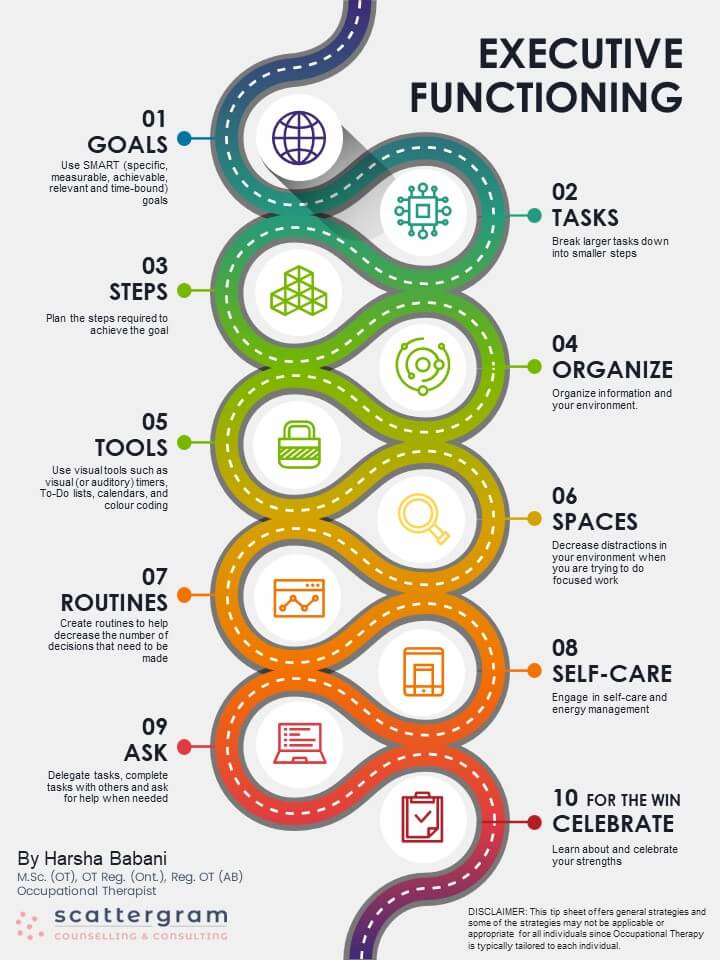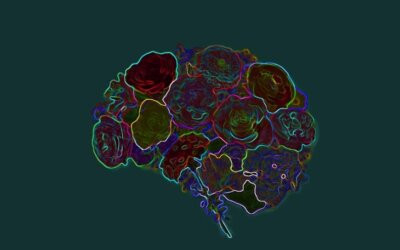By Harsha Babani
M.Sc. (OT), OT Reg. (Ont.), Reg. OT (AB)
Occupational Therapist
We’ve put together some tips to enhance executive functioning (planning, organization, prioritizing, initiating tasks, controlling our emotions, regulating our behaviour, making decisions, problem-solving, paying attention, etc.)
Executive functioning refers to a set of mental skills that help us participate in
daily life activities. Executive functions include mental skills such as planning,
organization, prioritizing, initiating tasks, controlling our emotions, regulating
our behaviour, making decisions, problem-solving, paying attention, etc. Here
are some tips to enhance executive functioning:
- Use SMART goals: SMART is an acronym for specific, measurable, achievable, relevant and time-bound. This will help you clearly define your goals and provide a framework for achieving your goals on time.
- Break larger tasks down into smaller steps: This will make the larger task more manageable and allow you to focus on one step at a time. This can make the larger task feel less challenging and overwhelming. To make this strategy even more effective, start with the smallest or easiest task first to help you get started.
- Plan: After you have identified your goal, write down the steps required to achieve the goal. This is your plan. Next, implement the Plan. Review your plan and make adjustments as needed. Frequently check back on your goal to help you stay on track.
- Organize information and your environment. Organize information and your environment. This can include filing systems, labels, storage bins, calendars/planners, digital organization tools, apps, etc. It will be easier to perform tasks if you know where everything is and where to find things.
- Use visual tools: This can include a variety of tools such as visual (or auditory) timers, To-Do lists, calendars, colour coding, etc. Using visual tools can help enhance organization, prioritization, time management, task initiation and attention.
- Set up the environment: Decrease distractions in your environment, particularly when you are trying to do focused work. Some strategies may include avoiding multitasking, turning off the TV, putting on noise-cancelling headphones, closing extra programs and tabs on your computer and putting your phone in focus mode.
- Create routines: Routines can help decrease the number of decisions that need to be made. Decision-making is an executive function that can be challenging for some people and that can impact time management. Routines allow you to participate in tasks without having to make too many decisions. This can help you to better focus on tasks.
- Engage in self-care and energy management: Take frequent breaks and engage in leisure activities to help manage your overall energy levels. It is important to meet your basic physical needs such as eating, drinking, sleeping, exercising and stress management.
- Ask for help: Delegate tasks, complete tasks with others and ask for help when needed. Telling someone about the goal you are trying to accomplish can help build external accountability and provide an additional source of support.
- Learn about and celebrate your strengths: While the challenges you
experience can significantly impact daily life functioning, your strengths can also greatly influence how you participate in tasks. Learn about your strengths as they can help you accomplish your goals. There is only one of you and you have unique strengths and gifts to offer. That is to be celebrated!
For more information about our Occupational Therapist, Harsha Babani, visit her page here.
Downloadable Tip Sheet
We’ve put together some tips to enhance executive functioning (planning, organization, prioritizing, initiating tasks, controlling our emotions, regulating our behaviour, making decisions, problem-solving, paying attention, etc.)





